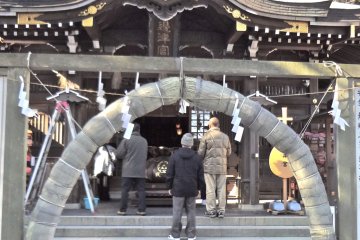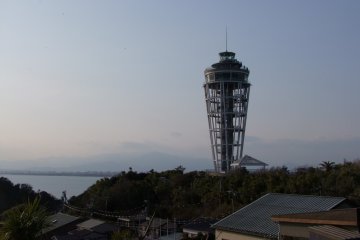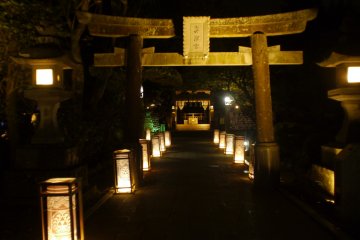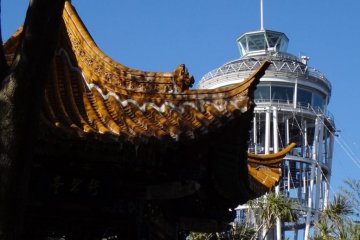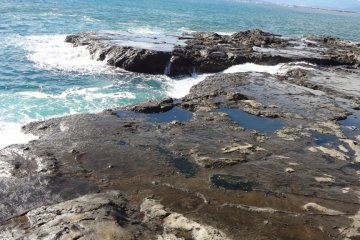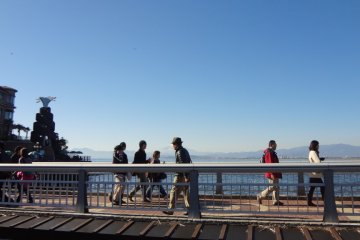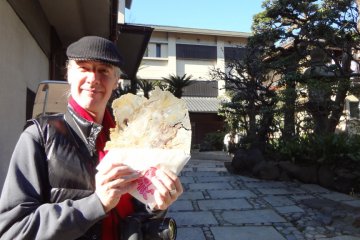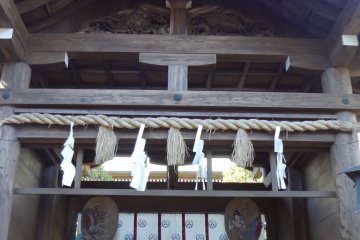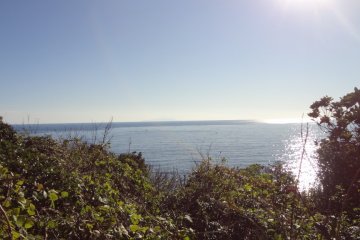Enoshima Island is a hot spot for sightseers that has been well maintained since the Edo era. Before then, the island itself was treated as a holy place and was protected by the Emperor and other influential people.In the Edo era, huge numbers of people paid a visit to Enoshima shrine to worship, simply because only worshipers could get a pass easilyfrom the government. After that, Enoshima was forgotten for quite a while. Before that however, Enoshima was an island brimming with mythology.
Enoshima Mythology
Long, long ago, a five-headed dragon lived here and always did evil things to the people in a nearby village. He especially loved to eat children and parents had to continually overcome the sadness of their deaths. Because of this, the village was called Koshigoe (“place people recover from tragedy”). One day, amidst ominous clouds and a strong earthquake, a beautiful maiden came down from the heavens to the sea. An island suddenly appeared as a place for her to land. The dragon was watching her and fell in love immediately. He asked for her hand in marriage. The maiden who knew the dragon did horrible things, turned down his proposal. But she said she would reconsider the proposal if he mended his ways and tried to help people instead. Thereafter, the dragon devoted himself to protecting and assisting people. And the maiden accepted him finally. The island was then developed and improved due to the dragon’s support and protection for a long time. But at last the dragon died a natural death. He laid his body on Fukasawa village (in modern day Kamakura) and his mouth settled on the earth just at the location of Ryu-ko-jinja shrine (“the mouth of the dragon”). If you look closely at the shape of the hills between Kamakura and Enoshima, you might feel that he is still there, watching and protecting the island.
Exploring Enoshima Island!
- The Enoden tram connects Kamakura and Fujisawa. If you get on the tram from Kamakura, you should definitely first visit Daibutsu (The Great Buddha) near Hase Station before going on to Enoshima. The place where Daibutsu sits used to be called Fukazawa, the village in the myth where the dragon laid down his body when he died.
- Enoden’s Koshigoe Station, the village in the myth where the parents lost their children is here. Get off the tram and walk around. How do you feel?
- After reaching Enoshima Station, you can walk to the island within 15 minutes. The view from the bridge going over to the island is really nice. Many people will be walking to Enoshima, so just follow them. Souvenir shops and restaurants line the street straight ahead of you heading up to the shrine. Asahi-ya, on the left, is famous for its thin octopus crackers. Have a try! There are many other interesting shops here. Enjoy looking around. Then climb the stairs or take the escalator (it’s not free) to the top. The maiden who came down to Enoshima is enshrined at the first shrine, called Hetsuno-miya (辺津宮).
- Next, go up a bit more to the top of the hill where you will see Samuel Cocking Garden. Without going into the garden, go straight to “Koibito-no-oka.” There is a great view of the sea looking down on Sagami Bay. At the cliffside, there is a bell and huge numbers of padlocks hanging on a metal fence. Connected to the dragon’s love story: It is said that if a couple rings the bell and hang a lock here, they will never separate. Hmmm…Is that good or bad?! Incidentally, you can buy a lock at some of the souvenir shops on the island.
- Now, walk down the hill (to the right) all the way down to the western edge of the island. There is a wide rocky stretch here, and it is from here that you can see Mt. Fuji (if you are lucky). This rocky beach is called Chigo-ga-fuchi. It suddenly appeared from the sea in 1923, during the Great Kanto Earthquake. You can go down and enjoy fishing on the rocks. Or just look for some shellfish and shrimp. When the weather is bad, this part of the island is off-limits. It is just too wild and dangerous.
- Heading on a few minutes more, you will reach the bottom of a rock cliff. There is a cave here called Iwaya. The tide eroded the rocks for so long that several caves were formed. Now, we can explore two of them. One is 152m long and the other is 112m long. In the old days, Buddhist monks practiced in the caves, and sometimes the dragon appeared and taught them things. Why don’t you try this mysterious cave?



